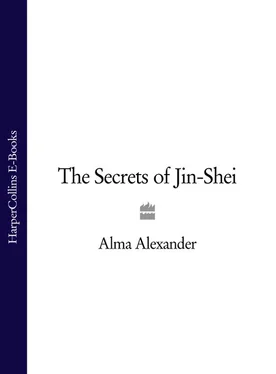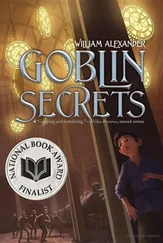The man’s face was young, unlined, the hair long and lustrous and tied back in a plaited queue like the workers wore – but his hands were not worker’s hands, and his eyes were not a young man’s eyes. The hands were smooth and white, nails manicured, a sure mark of an aristocrat with servants at his beck and call, even if it wasn’t for the telltale fall of expensive material of his gown that spilled in carefully arranged artless folds as he bent to help Nhia up. The eyes were opaque with ageless wisdom, dark and kind and utterly mysterious.
‘I …; thank you, I am fine now,’ she said, knowing as surely as she knew her own name that she was addressing someone a thousand times removed from her in rank and stature and appalled at her temerity in saying anything at all to such a personage. By rights she should have stood quietly with her eyes downcast until addressed directly.
The man dropped one of his hands from her shoulders, and Nhia attempted to stand unsupported but made the mistake of supporting her weight on her weak foot again. She tried to hide the inadvertent wince, but obviously failed when a cultured voice with a Court inflexion and intonation said, ‘I think not.’
He slipped an arm around her shoulders and helped her off the path, steering her to the nearest bench in the gardens, and letting her subside gently onto the seat.
‘Thank you,’ she said again, helplessly.
‘Did you come here to pray about this?’ the man inquired courteously, inclining his head the merest fraction to indicate her foot, not naming the affliction, as politeness demanded.
‘No, sei. No, my Lord, that is my mother’s reason for visiting the Temple.’
‘Oh?’ he said. ‘And not yours?’
‘I come here to understand, not to beg for petty miracles,’ Nhia said, and then bit her lip to prevent a small gasp from escaping. She had offered a discourtesy, at the least, and he could take her remark as borderline blasphemous if he chose.
‘How old are you?’ asked her benefactor instead, unexpectedly, after a pause which might have indicated surprise.
‘I turned thirteen only a few days ago, sei ,’ Nhia said, relieved to be back on safe ground.
‘I have heard the name of a young girl who comes here to talk of the spirits with the Temple acolytes,’ the man said thoughtfully. ‘Would that be you? What is your name, child?’
‘NhiNhi,’ Nhia said, instinctively giving her child-name, the name her mother had called her by when she was a baby, and then flushed scarlet. ‘I mean …; Nhia, sei. ’
‘Nhia,’ he repeated, with an air of committing it to memory. ‘Well, Nhia, seeker of wisdom, perhaps we shall meet again.’
Nhia dared a quick, flickering look to his face. ‘Yes, sei ,’ she said, aware that she sounded like she was indicating an agreement to that future meeting instead of a simple response that his words seemed to demand.
He straightened, gestured to someone out of Nhia’s line of sight, and then bowed to her lightly – bowed to her! – and strode away in a whisper of expensive silk robes.
Nhia realized she was trembling.
When hurrying footsteps approached her a moment later, she lifted her eyes to meet the intensely curious gaze of her friend from the Third Circle. ‘What did he say to you?’ the acolyte demanded, sounding astonished. ‘Do you realize who that was ?’
Still thunderstruck, aware of a murmuring crowd gathered in the cloisters which had been a collective witness to this strange encounter, Nhia stared at the gate through which her young lord had disappeared. ‘I think I do,’ she whispered. One of the Nine Sages is in the Fourth Circle today …;
‘He is Lihui. That was Sage Lihui. He is the youngest of the Nine Sages, the one who came to honour us today. I saw you fall at his feet and I was afraid, but he …;’
Nhia’s eyes were wide as saucers. She had been right but …; a Sage? A Court Sage had stopped to raise a crippled child, to ask her name …;
Perhaps we shall meet again , he had said.
Perhaps the ganshu readers had never told Nhia about this encounter because it had never been meant to take place. The acolyte had trusted her with the information that a Sage was in the Temple; the collapse of her ankle might have been pure chance, but a part of her had known at whose feet she had been thrown, and had guided her tongue as she had spoken to him.
Nhia looked around at the flickering lights of candles and oil lamps of the Third Circle, at the haze of brightness surrounding the weavers of human fates, the Rulers of the Four Quarters, and smiled to herself. She had put herself in the paths of the Gods this day. Perhaps she had just taken her first fragile step beyond the veil which ganshu had drawn over her life and destiny.
‘For the love of all the Gods, Khailin, and for the last time – not today! The Chancellor …;’
Khailin’s face set in mutinous lines. ‘The Chancellor! That means I won’t see you until nightfall, and that means I don’t get my lesson today.’
‘Think of it as a day of rest,’ said her father, with some impatience. Then he smoothed the frown off his forehead, and sighed. ‘Khailin, knowing your hacha letters is not going to magically –’
‘I know,’ Khailin said. ‘I know what it won’t do for me. But there is so much out there that I want to know, and that I will never know if I can’t …;’
She faltered under her father’s rather stern gaze. ‘And you do remember, I trust, that these lessons are based on a proper attitude on your part. I will not have you interrupting me, Khailin. It shows disrespect to your parents.’
‘Yes, Father,’ Khailin said, resigned.
‘Good. That’s settled, then. We will resume our lessons when I return from the Palace. In the meantime, I suggest that you pursue your …; other responsibilities. I will have to speak to your mother about that. Within a year or two you may well be married and will have no time for indulging such whims as books and studies.’
Khailin bowed to her father with the exact degree of respect that was required, keeping her eyes lowered so that he wouldn’t see the rebellion in them. Cheleh, Court Chronicler, permitted himself one affectionate feather-like brush of his hand on his daughter’s hair before bowing back to her with the proper degree of acknowledgement and leaving her alone in her chamber.
When the door safely closed behind him, Khailin picked up a tasselled cushion from her bed and threw it against the wall with a muted cry. She had just come to an interesting section of a text her father did not know she had purloined from his scroll library, and she had become thoroughly bogged down in it. She had hoped to wheedle some information from him that day, without letting on that she had the scroll, of course, and finish reading the text that evening. It was an old astronomical treatise, written by a Sage from a long-dead Emperor’s court; Khailin could tell, even with her inability to completely understand, that much of it was already obsolete, but there had been several descriptions in there which matched something she had been able to observe herself in the night sky with the distance viewer her father had in his study. She had hoped that she would be able to extract enough information from this scroll to confirm her own observations, and perhaps find out where she could obtain more recent material on one particular celestial object which had caught her fancy, a red-gold sphere with an annulus around it.
She had started wheedling her father to teach her hacha-ashu , the script of the common tongue, when she first realized that jin-ashu , the script her mother had been dutifully teaching her since she had turned four years old, was not the language in which the really interesting things were written. Jin-ashu was a woman’s language, and it was the heart of a woman’s world. Its writings tended to be confined to poetry, legends, stories, the wisdom of hearth and home, letters between jin-shei sisters (whether separated by the length and breadth of Syai or three streets apart in the same city). Jin-ashu dealt with the everyday and the commonplace, the household chatter of wives and mothers, the pouring out of an unrequited love or the transports of delight of a new wife just initiated into the pleasures of marriage. Khailin had seen a few of the latter, although she was still to undergo her Xat-Wau coming of age ceremony and was considered far too young for what were sometimes frankly erotic letters between grown and sexually initiated women. But Khailin read what interested her, and if she could sneak an astronomy treatise out of her father’s treasured library, her mother’s stacks of jin-ashu letters were a considerably simpler problem to riffle until she found material that caught her eye. She knew considerably more than either of her parents suspected about what awaited her as a young woman who was rapidly approaching marriageable age.
Читать дальше






![Theresa Cheung - The Dream Dictionary from A to Z [Revised edition] - The Ultimate A–Z to Interpret the Secrets of Your Dreams](/books/692092/theresa-cheung-the-dream-dictionary-from-a-to-z-r-thumb.webp)





